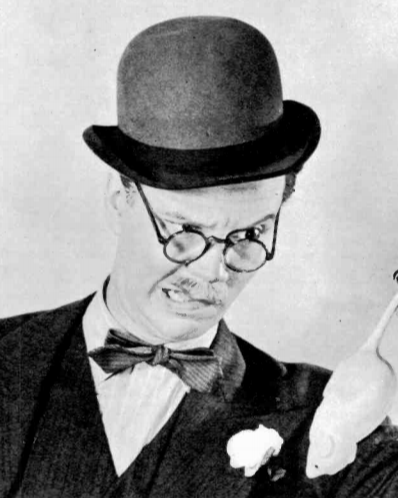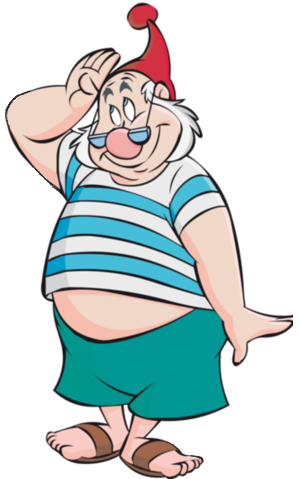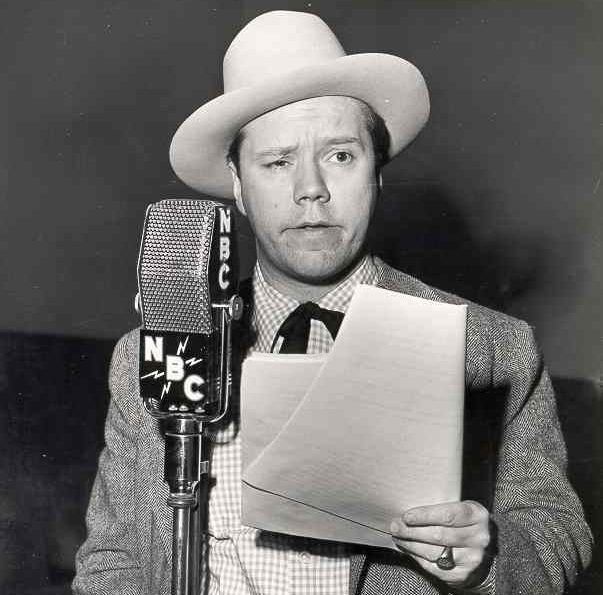Happy Birthday, Bill Thompson!
Posted by Ivan G. Shreve, Jr. on Jul 8th 2019
When he was five years old, actor Bill Thompson lost his voice campaigning around the country selling Liberty bonds (America had just entered World War I). Now, if you’ve ever listened to a broadcast of Fibber McGee & Molly or watched a Droopy cartoon, you know that Thompson’s voice eventually returned…but it took two years of throat exercises to recover his instrument. What’s more, Bill discovered as he got older that he was able to switch back and forth from bass to tenor with very little effort. (Doctors later determined that the actor’s ability to do this was a direct result of the temporary voice loss in his youth.) Combined with a fine comedic sense, the man born William H. Thompson on this date in 1913 in Terre Haute, Indiana enjoyed a long and prosperous career on radio and in movies, providing voices for many of both mediums’ most memorable characters.
Bill Thompson’s hawking of Liberty bonds was done while he was in vaudeville, where he performed as a song-and-dance man alongside his parents—he was a stage veteran at age two, making his debut performing a tap dance. He’d transition from the boards to a microphone in 1932 after a successful audition with NBC, garnering attention with a routine called “International Parade” (which included demonstrations of ten different dialects). Thompson then appeared on such programs as The Breakfast Club, Club Matinee, The Hoofinghams, and The Saturday Night Jamboree.

Bill Thompson joined Jim and Marian Jordan on The Johnson Wax Program in January of 1936, and for most of his radio career Fibber McGee & Molly would be his bread-and-butter. In the show’s early years, he played cafeteria owner Nick Depopolous, a malapropism-prone Greek who got big laughs mispronouncing words. (He called Fibber “Fizzer” and Molly “Kewpie.”) Thompson also voiced Horatio K. Boomer (originally known as Widdicomb Blotto), a garrulous con man who sounded very much like W.C. Fields. That character’s standard shtick was rummaging through his pockets…where he would invariably find “a check for a short beer.” Nick and Boomer would eventually fade out in the early forties, though there’s a Bing Crosby Show broadcast from October 10, 1951 that allows Bill to reprise his Boomer characterization.
One of the most popular Fibber & Molly characters voiced by Bill Thompson included The Old Timer, a half-deaf old codger who often had to have Fibber repeat things to him (“Whut say, Johnny?”)…and never failed to be tickled by McGee’s predilection for stretching the truth. “That’s purty good, Johnny,” The Old Timer would observe, “but that ain’t the way I heerd it!” (To do the Old Timer, Thompson would distort his jaw and speak as if he had no teeth.) Another Thompson characterization that really took hold was Wallace Wimple, a henpecked creampuff who was forced to drop in on the McGees at 79 Wistful Vista to escape “Sweety Face” his “big ol’ wife.” The Wimple character was one that Bill had performed as far back as his days on The Breakfast Club, and the voice would later be recycled for a series of popular MGM cartoons featuring Droopy, a stone-faced basset hound (“Hello, folks…”). The studio would produce the Droopy cartoon series from 1943 to 1958.

It could be argued that voicing Droopy was Bill Thompson’s longest-lasting contribution to motion pictures because outside of a few feature film appearances (1940’s Comin’ Round the Mountain, 1942’s Here We Go Again—the Fibber McGee & Molly film in which he plays Wallace Wimple) his movie appearances were rare. Yet this would diminish his work in many of the animation classics released by the Walt Disney Studios. In Alice in Wonderland (1951), he voiced both the Dodo and the White Rabbit, and he was Captain Hook’s sidekick Mr. Smee in Disney’s Peter Pan (1953). (Thompson would reprise this role in a Lux Radio Theatre presentation on December 21, 1953.) Bill also did voice work in Sleeping Beauty (1959; as King Hubert) and The Aristocats (1970; Uncle Waldo), not to mention several Disney shorts in which he played park ranger J. Audubon Woodlore (Beezy Bear, In the Bag). His most impressive feat was voicing five characters in 1955’s Lady and the Tramp, notably Jock, the pugnacious Scottish terrier.
Bill Thompson’s work on Fibber McGee & Molly was interrupted briefly in the mid-1940s while he was “doing his bit” in the Navy. When he returned, he was given his own starring sitcom (The Bill Thompson Show) that aired briefly in the spring of 1946 on ABC. In addition to his Fibber & Molly duties, Bill was a guest on programs headlined by Edgar Bergen & Charlie McCarthy, Jimmy Durante & Garry Moore, Phil Harris & Alice Faye, Red Skelton (Avalon Time), and Rudy Vallee. Thompson also guested on The CBS Radio Workshop, Command Performance, The Great Gildersleeve, The Halls of Ivy, and Wild Bill Hickok. Thompson left show business in 1957 to take an executive position with Union Oil in Los Angeles but continued to keep his hand in when the mood hit. (He appeared on To Tell the Truth in 1959 as a contestant!) This talented, funny man left this world for a better one in 1971 at the age of 58.

As a kid, it would be many years before I discovered the joys of old-time radio…but I already knew Bill Thompson as the voice of one of my cartoon heroes: Touche Turtle! (“Touche away!”) Bill voiced this character for a series produced by Hanna-Barbera in 1962, where he was joined by veteran radio actor Alan Reed as his loyal sheepdog sidekick Dum Dum. Radio Spirits invites you to celebrate Mr. Thompson’s natal anniversary by picking up a few collections featuring his work on Fibber McGee & Molly: Cleaning the Closet, Gone Fishing, and Wistful Vista. You’ll also hear Bill on several of the wartime broadcasts featured on our Edgar Bergen & Charlie McCarthy compendium Smile a While, and on the sets The Halls of Ivy: School Days, The Phil Harris & Alice Faye Show: Smoother and Sweeter, and Great Radio Science Fiction (the CBS Radio Workshop presentation of “A Pride of Carrots”). Happy birthday, Bill!

